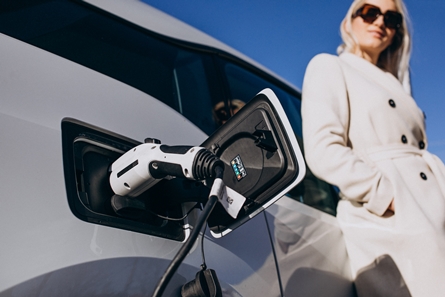FAQs
In New Brunswick, annual fuel costs for a battery electric vehicle is approximately $500 in electricity while a plug-in hybrid costs $180 in electricity plus $450 in gas compared to over $2,000 in gas costs for a compact car. These costs are based on travelling 20,000 km per year. Actual savings will depend on the model of car and driving patterns of the driver.
In general, fully electric cars cost about one-sixth as much to ‘fuel’ using electricity, compared to a gas car. Furthermore, electric cars require less maintenance. They don’t need spark plugs, oil changes, transmission fluid, mufflers or exhaust pipes.
By switching to an electric car in New Brunswick you can reduce your CO2 emissions by approximately 80%.
While electric cars do not emit CO2 from the burning of gas, the emissions from the electricity used to charge the batteries must be considered. By 2020 - when we expect 75 percent non-GHG emitting energy- there is expected to be a further 15 percent reduction in CO2 emissions as additional clean renewable energy sources come on-line in New Brunswick. This will reduce the CO2 emissions to approximately 215g per kWh.
Based on driving 20,000km per year, a plug-in hybrid electric vehicle emits approximately 1,400kg of CO2 and a battery electric vehicle emits about 725kg compared to approximately 4,200kg from a compact gas car.
As the province’s electricity provider, NB Power is committed to supporting and facilitating the electric vehicle market as it evolves in the province so customers have access to electric vehicle technology, products and services when they are ready for it. Across North America, the electric vehicle market is evolving and car manufacturers and dealers are beginning to embrace this evolution. The number of electric vehicle certified dealers is growing each month, and New Brunswick already has approximately 15 certified dealers in the province.
NB Power needs to be prepared for the increased adoption of electric vehicle, as studies predict significant growth in electric vehicle sales by 2025. NB Power wants to ensure that it can serve these customers and also ensure these vehicles don't have a negative impact on the power grid.
NB Power recognizes electric vehicles (EVs) are a part of the solution to climate change mitigation and creation of a sustainable energy future that embraces renewable energy sources and reduces reliance on fossil fuels.
NB Power is facilitating the growth of the electric vehicle market in New Brunswick by establishing a network of public charging stations aimed at giving electric vehicle drivers worry-free driving everywhere in New Brunswick.
The eCharge network includes public level 2 chargers and DC Fast Chargers located at participating municipalities and businesses throughout the province.
By working with public and private partners, NB Power is establishing a network of public charging stations to give electric vehicle drivers worry-free driving everywhere in New Brunswick.
Fifty per cent of NB Power’s light duty passenger fleet vehicles are electric and NB Power has helped to conduct fleet reviews with municipalities and PNB to see where there may be opportunities for electric vehicles. We have also tested charging stations in New Brunswick’s climate and installed a number of standard level 2 public and fleet charging stations throughout the province.
Networked chargers are connected to the internet and can receive software updates remotely, track revenue collection for charging sessions, show charger availability, and have usage reporting capability. In the future, networked chargers will also be able to connect to the Integrated Load Management System (ILM).
The above benefits are not available on non-networked chargers.
In order to use an eCharge Network charging station, you must become a member of the network by signing up at echargenetwork.com or by downloading the mobile app. Once you have a card:
At a standard level 2 station:
The rates are set by the station owner and are as follows: $1.50/hour or $3.00/session
- Pass your access card in front of the reader OR use the mobile app to select the station and press “Start a session”.
- The charging connector will unlock, allowing you to plug it into your vehicle.
- As soon as the connector is plugged into your vehicle, the charging sequence begins.
- Upon your return, place the connector back in its designated compartment and close the door.
At a fast-charging station:
The rate is $15/hour and billed by the minute. Total costs are determined based on the total time connected to the station, not the duration of the charge or the total energy transfer.
- Plug the connector (CHAdeMO or SAE Combo, depending on vehicle model) into the vehicle
- Activate the station by: Placing your card on the reader OR selecting the station in the eCharge Network mobile app and pressing “Start a Session”.
- Wait until the “START” button (located at the front of the station) starts flashing, and then press it.
Once charging is complete, press the “STOP” button, unplug the connector and replace it in its socket.
Yes, in order to use an eCharge Network charging station, you must become a member of the network by signing up at echargenetwork.com or by downloading the mobile app. Once you have a card:
At a standard level 2 station: The rates are set by the station owner and are as follows: $1.50/hour or $3.00/session
At a fast-charging station: The rate is $15/hour and billed by the minute. Total costs are determined based on the total time connected to the station, not the duration of the charge or the total energy transfer.
Yes, you should expect that charging an electric vehicle will increase your overall electricity consumption, which will result in nominally higher monthly charges. However, your refuelling charges will be significantly less than the cost to fuel with diesel or gasoline and you will not have the costs associated with the operation and maintenance of internal combustion vehicles.
If you have decided to install a charging station at home, consult a licensed electrical contractor for an estimate.
Possibly. Consult an electrician as in some cases homes need to be upgraded to a 200 amp service, depending on other electrical loads in your home.
A standard 120 volt wall outlet can provide level 1 charging.
You can also install a faster home charging station (Level 2 - 240 volts) which uses the same receptacle as a clothes dryer. NB Power recommends homeowners install a networked residential charger, as networked chargers enable their owners to remotely manage charging, obtain usage data and in the future will enable Smart Grid functions. The average price of a level 2 (240 volt) networked residential charger is about $1,300. The cost to install a charger can vary greatly – from a few hundred dollars to a few thousand.
Think of your home charging station like any other appliance in your home. It is up to you if you want to take it with you when you move or sell it along with your EV. Depending on the kind of station you have, you may be able to simply unplug it. If the charging station is wired into your home’s electrical system, you may need an electrician to disconnect it.
If you purchase a second EV, you can install a second charging station if you have sufficient capacity on your electrical panel, something an electrician can determine for you. Another alternative is to replace your existing station with a dual-port model. These are more expensive than standard stations because they manage the charging activity of two EVs within the power supply of a single charging station.
Almost every auto manufacturer in the world has an EV available for sale right now or is close to releasing one. In Canada, there are 50+ different EV models available that have different price ranges, capabilities and vehicle sizes.
New Brunswick Power has partnered with Plug’n Drive, a non-profit organization that promotes electric vehicles for their environmental and economic benefits, to bring you “Find Your EV Match”.
This is an online tool that New Brunswick drivers can use to discover how much money they can save and how much they can reduce greenhouse gas emissions by switching to an electric vehicle. The tool allows users to set their personal budget, annual driving distance and auto brand preferences among other items to find the EV that best matches their lifestyle.
Click here to Find Your EV Match.
NB Power continues to grow and expand our charging infrastructure. We apply for provincial and federal funding to improve the eCharge network charging infrastructure to meet customer demand and expectations. External funding is used for the purchase and installation of all new public EV chargers.

- Catalogue of every EV model available for sale in Canada
- Cost savings calculator based on postal code
- Database of Canadian EV incentives
- Side-by-side comparison for gas and electric cars
- Public charging station locator
Find Your EV Match









